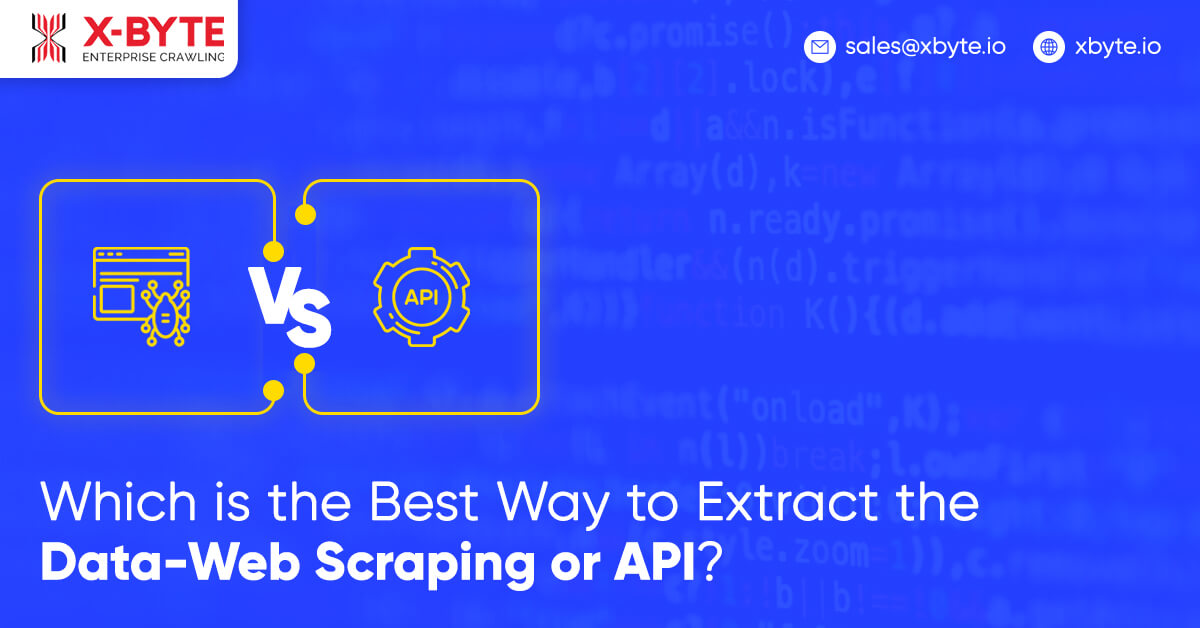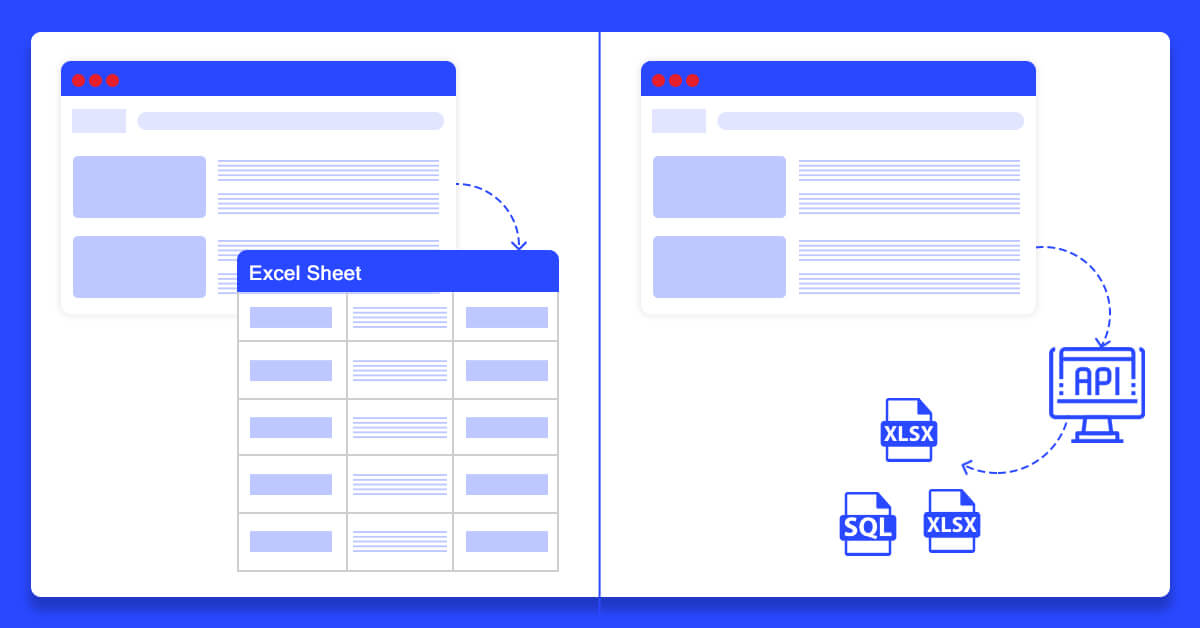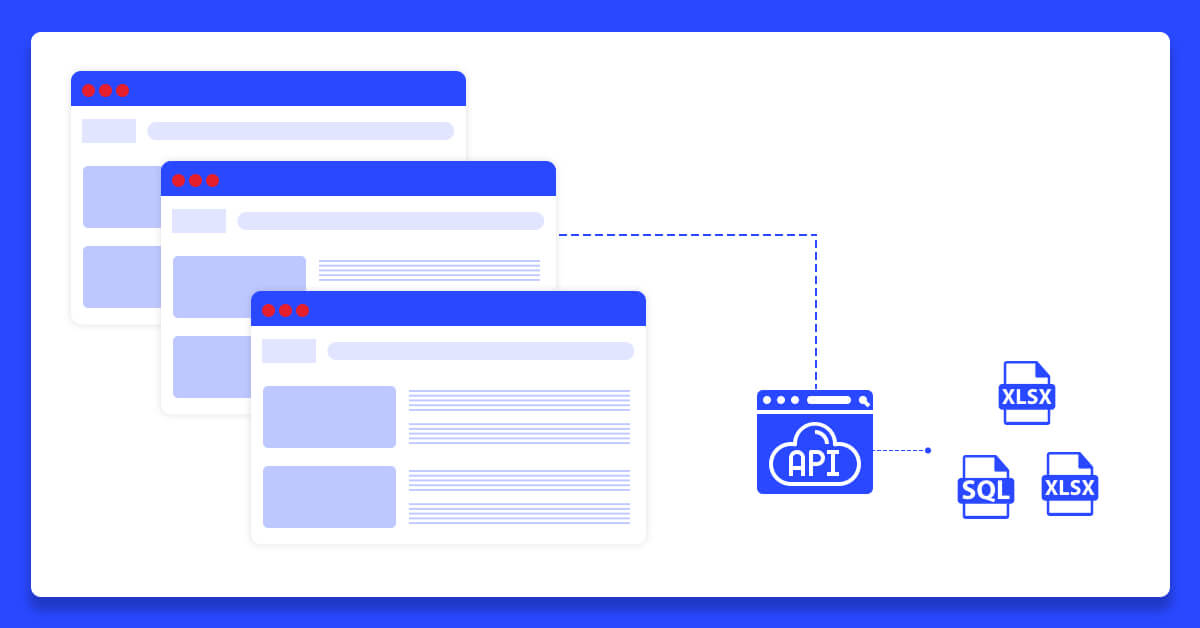
Data extraction has become important as a result of technological advancements and the digitization of enterprises. Web scraping can provide businesses the edge they need to outperform their competition in this digital age. Web scraping allows a company to undertake more extensive market research and competitor analysis. Furthermore, the information obtained through these methods helps keep a company updated with changing industry trends.
Data is so important that many organizations wouldn’t know where to start if they didn’t have it. Fortunately, the amount of information available on the internet might be overwhelming. On the contrary, collecting and analyzing such huge amounts of data is quite difficult.
Companies use two common data extraction approaches to address this requirement: web scraping and APIs.
What is the Difference between Web Scraping vs. API?

Web scraping is the process of manually or automatically obtaining information from websites or even a webpage. Web scraping with the aid of software tools is usually chosen over the manual method since it is more efficient and time-consuming. Web scraping is a technique for extracting relevant data from many websites. The program and tools then turn the large amounts of data into an organized manner that the users can understand.
Meanwhile, an API (Application Programming Interface) provides access to an application’s or operating system’s data. As a result, APIs are reliant on the dataset’s owner. The information might be made available for cash or on credit. The administrator could also restrict the number of queries or the volume of information that a single user can access.
While web scraping allows you to collect data from any website using web scraping tools, APIs give you direct access to the data you’re looking for. Web scraping allows users to obtain material until it is published on a website. Though, data access could be either too restricted or too expensive, whenever it refers to APIs, though.
Data is normally extracted from only one website (unless it’s an aggregator) using APIs, whereas data is accessible from several websites using web scraping. Additionally, API allows you to retrieve only a certain collection of data.
There is a dependency on proxy servers when it comes to web scraping, however, this is not the case with APIs. The data is organized into a structured format by the web scraping application. However, a developer will need to programmatically manage the information retrieved through the API.
The user can retrieve data later due to automatic data storage provided by the web scraping approach. An API can’t do this method. Web scraping is also far more adaptable, complicated, and even has a system of regulations when compared to API.
Web Scraping vs. API: Similarities
Web scraping and API scraping are the most popular methodologies among data engineers. Mostly in end, both techniques offer a similar job of presenting data to the user, even though they work in distinct ways.
A user can get previously unseen client information and insights using these new methods of obtaining information. A user can utilize emails for email marketing and lead creation utilizing any of the procedures (web scraping or API).
Why Web Scraping is Beneficial than Extracting Information through APIs?

The first step in web scrapi
Web scraping is the option to choose if you are a business that requires up-to-date information. There will be few restrictions, and web scraping tools can help users achieve better outcomes. Furthermore, it may be customized to retrieve the precise type of data that a company requires.
Take a look at the following examples to see why you should use web scraping:
ng is to find the website URL we want to scrape. We can start by looking at the TripAdvisor home page. From there, we can navigate to the page for a specific hotel.
1. Absence of Rate-Limiting
Web scraping does not have a limit as that of API scraping. APIs are expensive and maybe prohibitively expensive for small enterprises seeking market intelligence. APIs are likely to burn a hole in your pocket because users will spend a lot of time accessing data. If the company opts for web scraping, , there would be no cost to retrieve information from any web page.
However, it’s best not to browse websites where the robot.txt file expressly forbids it. It is well-known that the web pages that appear on Google can be scraped. Still, on the ethical point of view, if a website’s robot.txt prohibits users from scraping, it should be obeyed.
2. Limited Information Available Through an API
The API may not provide access to all publicly available data. So, even though the API is provided, we may have to rely on web scraping in some circumstances.
3. No Customizations with API
By modifying your crawler’s user agent, you may customize everything from data extraction procedure to the regularity, format, and structure. With a website’s API, this versatility is no longer possible. Because the consumer has little influence over it, personalization will be restricted or non-existent.
4. Every Website Does not Allow to Scrape the Data
While some websites enable data scraping, many others do not. Access is available on a few websites. Using API may be your only alternative in this instance. Facebook is a wonderful example.
5. Near Real-Time and Relevant information
Databases retrieved through APIs are unable to be updated in near real-time, rendering the information obsolete. Near-real-time information enables businesses to have more reliable information, which will improve your findings. The use of scraped data to feed into wealth management forecasting analytics, when every second matters, is an excellent example.
6. Anonymity in Web Scraping
A person can stay confidential when extracting information through web-scraping. When using API, that’s not possible because the user must register to acquire a key, which must be passed along each time data is requested.
7. Better Management in Web-Scraping
It takes a long time to navigate an unstructured API. Before you can access the data, you may have to deal with queries. However, websites today, desire to be XHTML verified for better search engine ranks, and the system is simple to scrape.
Web Scraping + API:
Websites include a wealth of data that can be beneficial to organizations, and this data can be of any type. The gathered data is used in a variety of ways, from contact information to stock prices, depending on the needs of the company. Some businesses analyze their pricing policy to those of their competitors using website data. Businesses, meanwhile, use the information to extend their email list and research dynamic market changes to address them.
Don’t be concerned if you’re questioning whether web scraping is legal. It’s permissible. Respecting a site’s terms and conditions, refrain from scraping confidential material, and not overloading a site’s servers are all good ways to avoid difficulties.
Contact X-Byte Enterprise Crawling if you need a large amount of data scraped. We’ll give you a custom web scraper tool to fulfill your scraping demands.
